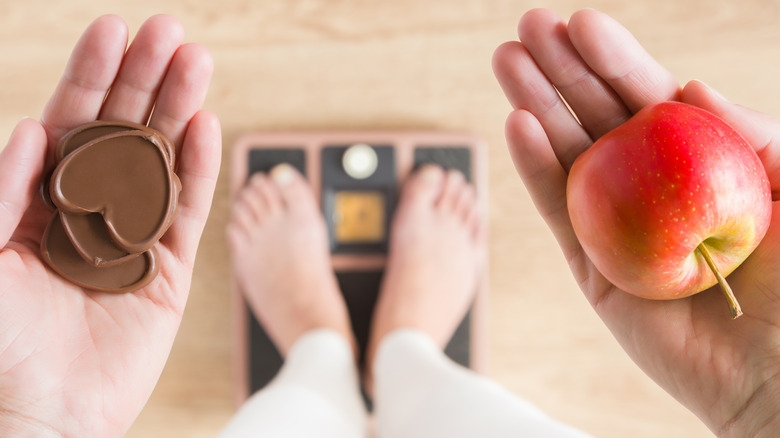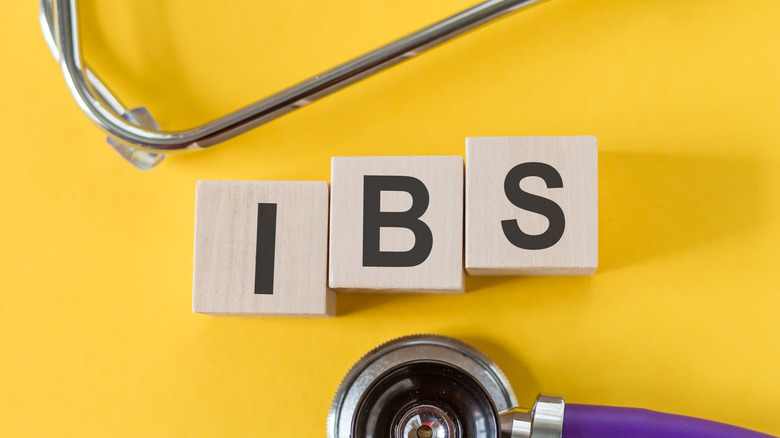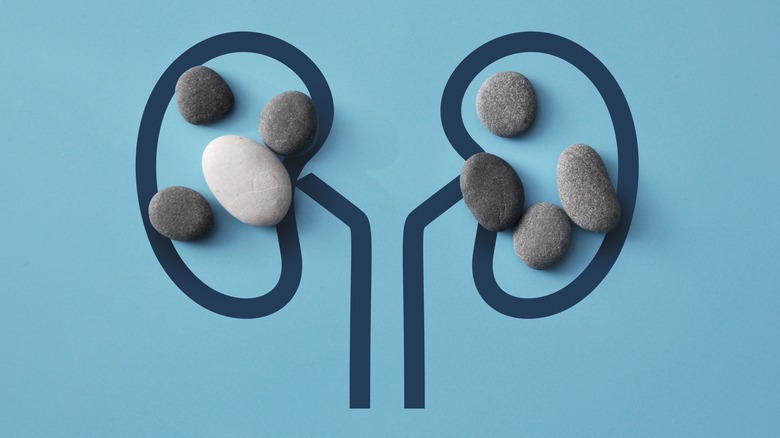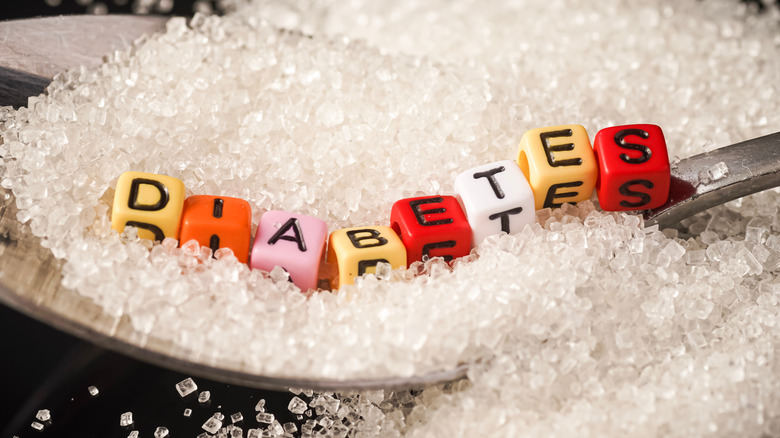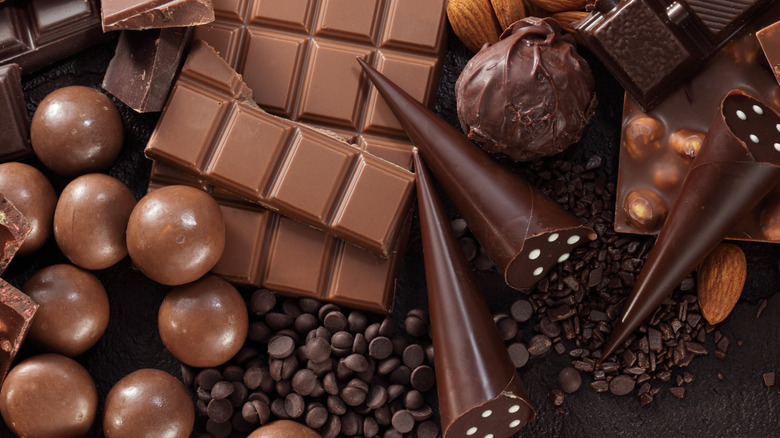When You Eat Too Much Chocolate, This Is What Happens To You
Do you ever find yourself snacking on chocolate while watching TV or before bedtime? The truth is that no one can blame you. Chocolate, whether we're talking about Swiss specialties or bittersweet varieties, has an amazing flavor. After just one bite, it melts in your mouth and leaves you craving more. Plus, it's chock-full of antioxidants and healthy fats. But even so, eating too much chocolate can do more harm than good.
Dark chocolate is particularly healthy due to its high antioxidant levels. Cocoa, its main ingredient, boasts large amounts of flavanols, copper, iron, zinc, magnesium, and other nutrients, states Harvard T.H. Chan School of Public Health. As the researchers note, cocoa flavanols may protect against diabetes and high blood pressure, leading to a lower risk of heart disease. On top of that, dark chocolate is relatively low in sugar. Ideally, choose a brand with at least 70% cocoa to reap the benefits.
But what happens when you eat too much chocolate?
Eating too much chocolate can lead to weight gain
Chocolate packs a lot of flavor, and it's easy to go overboard. The calories can add up quickly. Milk chocolate, for example, boasts around 150 calories, 16.8 grams of carbs, and 8.4 grams of fat per ounce, according to MyFoodData. White chocolate has a similar nutritional value, but it's slightly higher in fat. Dark chocolate with 70 to 85% cocoa, by comparison, provides 170 calories, 13 grams of carbs, and 12.1 grams of fat. While it's healthier than other varieties, it can still make the scale go up.
On the positive side, dark chocolate may increase satiety and reduce sugar cravings due to its high fat content. In one study, men who ate 3.5 ounces of dark chocolate consumed 17% fewer calories at their next meal than those eating the same amount of milk chocolate before a meal (via Nutrition and Diabetes). The time of the day when you eat chocolate matters, too. Clinical evidence suggests that eating milk chocolate in the morning may suppress hunger and sugar cravings while increasing fat breakdown, according to the FASEB Journal. Surprisingly, eating chocolate in the evening may help your body break down and use carbs more efficiently.
However, subjects who participated in these studies consumed relatively small amounts of chocolate. The recommended serving size is 1 to 2 ounces, but most folks eat way more than that in one sitting (per Life Enriching Communities). Over time, this habit can result in weight gain and wreak havoc on your health.
Chocolate may cause headaches and insomnia
Most health experts advise against eating chocolate before bedtime. Cocoa, its primary ingredient, is naturally rich in caffeine. Dark chocolate supplies about 23 milligrams of caffeine per ounce (via MyFoodData). The same amount of milk chocolate has 6 milligrams of caffeine. An 8-ounce cup of coffee, by comparison, provides around 95 milligrams of caffeine. This means that eating 4 or 5 ounces of dark chocolate at once is pretty much the same as drinking a cup of coffee in terms of caffeine content.
Most people can safely consume up to 400 milligrams of caffeine per day, says the Cleveland Clinic. This ingredient isn't necessarily harmful. On the contrary, it can boost your energy and alertness, increase fat burning, and improve physical performance. But too much of it may cause insomnia, jitters, anxiety, headaches, and other side effects.
"Caffeine can aggravate the production of stomach acid," warns dietitian Beth Czerwony (via the Cleveland Clinic). Therefore, it's not an ideal choice for those with heartburn or gastroesophageal reflux (GERD). Since chocolate is relatively high in caffeine, it can lead to digestive issues. On top of that, some chocolate products contain heavy metals and may pose health risks for children and pregnant women, reports As You Sow.
All in all, it's best to enjoy this treat in moderation. If you find yourself eating too much chocolate, you may be lacking certain nutrients. Stress and low blood sugar can trigger chocolate cravings, too.
Chocolate can be bad for someone with IBS
If you have irritable bowel syndrome (IBS), then chances are you know it can come with a number of unpleasant symptoms, both physically and mentally. According to the University of Michigan, IBS patients can experience bloating, diarrhea, abdominal pain, and constipation, as well as anxiety and depression. And unfortunately, if you love chocolate — especially milk chocolate — the bad news doesn't stop there.
As the University of Michigan explains, milk chocolate contains several ingredients that could set off health issues like diarrhea, gas, and cramping in your gut. These ingredients include fat and milk proteins, as well as lactose and added sugar. Additionally, milk chocolate (as well as chocolate in general) usually has caffeine, which is why Mount Sinai recommends IBS patients monitor how much chocolate milk, milk chocolate, and dark chocolate they consume and make reductions to lower their caffeine intake.
Keep in mind that you don't have to have IBS to experience a bad reaction to chocolate. For example, a person with lactose intolerance could experience health issues from eating milk chocolate (via the University of Michigan). There's also data suggesting that dark chocolate might support the "good" bacteria in one's gut, per Medical News Today. But with all that said, IBS patients should be very careful about their chocolate intake. Overindulging in this popular treat, even just occasionally, could be setting the stage for gut issues later.
Can chocolate cause kidney stones?
Did you know that there's more than one type of kidney stone? As the Mayo Clinic explains, the most common types are calcium stones, which are typically a combination of calcium and oxalate. And since chocolate contains large amounts of oxalate, removing it from your diet is a way of avoiding calcium stones, right? Actually, there's more to it than that.
While diet can play a role in developing calcium stones, the National Kidney Foundation notes that just removing chocolate and other foods high in oxalate from one's diet isn't a "get out of jail free card" when it comes to kidney stones. In fact, registered dietitian Dr. Kristina Penniston told The University of Wisconsin that oxalate-rich foods can also contain fiber, as well as nutrients like potassium and magnesium, all of which are "stone inhibitors." Instead, Dr. Penniston emphasized the importance of a "healthy, balanced diet," which (let's be honest) is the opposite of overindulging in foods like chocolate.
So, does that mean splurging on chocolate cake once a year will lead to calcium stones? If you're in good health and the rest of your eating habits are healthy, that seems highly unlikely. But not eating the right quantities and combinations of food could raise your chances of developing calcium stones over time. The trick, according to the National Kidney Foundation, is to consume oxalate and calcium at the same time, so they bind together inside the stomach and intestines instead of the kidneys.
Chocolate (and poor dental hygiene) can affect your oral health
Children are usually taught early on that sugary treats like chocolate can cause cavities. But sugar alone isn't the issue. As Berlin Dental Arts explains, it's the bacteria in one's mouth that transforms sugar into teeth-damaging acid. Nevertheless, a diet high in sugar-rich foods can be especially bad for one's smile over time, especially when combined with poor dental hygiene.
Sugar content can vary between different types of chocolate. Take milk chocolate, for example, which usually contains more sugar than dark chocolate. In fact, the majority of milk chocolate tends to be a combination of sugar and powdered milk rather than cocoa. This is why milk chocolate is more likely to weaken the surface of one's teeth and lead to cavities. As a matter of fact, there is research that chemicals found in dark chocolate might help prevent sugar from becoming acids, and so might help protect one's teeth. With that said, dark chocolate can also contain sugar and milk, so eating too much of it can still be bad for one's teeth.
Of course, being careful about your chocolate intake alone isn't going to safeguard your teeth against cavities. It's just as important to brush and floss every day. Otherwise, any sugar you consume (from chocolate or otherwise) will remain in greater amounts potentially causing damage to your teeth.
Is there a link between type 2 diabetes and chocolate?
According to the American Diabetes Association (ADA), if a person has diabetes, that doesn't necessarily mean they can't have chocolate. But they also can't eat it on a regular basis — and definitely not in large amounts. In fact, the ADA recommends diabetics have "a very small portion" of sweets, and only on special occasions.
Additionally, a diet high in sugar-rich chocolate can be a factor in the development of insulin resistance, which can lead to type 2 diabetes. According to the Centers for Disease Control and Prevention (CDC), our bodies use the hormone insulin to help us use sugar for energy. However, when a person's blood sugar levels are high, the pancreas creates higher amounts of insulin to compensate. Eventually, the body's cells can become resistant to insulin, and the pancreas might not be able to produce enough insulin to take care of the body's needs, which can result in type 2 diabetes. Of course, this doesn't happen overnight. But as endocrinologist Dr. Ayushi Dixit told Hackensack Meridian Health, avoiding sugary foods today might help reduce the chances of developing type 2 diabetes tomorrow. And as Healthline notes, milk chocolate in particular is high in sugar.
Interestingly, there's research supporting the idea that chemicals found in dark chocolate might help with insulin resistance (via Healthline). However, dark chocolate can also contain sugar — and overindulging in any type of chocolate isn't wise, especially if you have insulin resistance or diabetes.
Is it possible to overdose on chocolate?
In the play "Death by Chocolate," a murderer successfully kills more than one victim with poisoned chocolates (via ORiGiN Theatrical). But while this whodunit is fiction, in real life, chocolate does contain a type of poison, per Psychology Today.
Now, before you panic and throw out all the chocolate candy in your home, the poisonous substance theobromine is only found in trace amounts in chocolate. So, it would take roughly a pound of pure chocolate to potentially be lethal. Furthermore, associated symptoms of theobromine (like nausea) work against someone consuming enough chocolate to die. All the same, if someone ingests large amounts of theobromine, they might experience symptoms like a severe headache, an accelerated heart rate, loss of appetite, and drops in blood pressure.
Although chocolate in large amounts has the potential to be bad for one's health, TODAY reported that a woman from Indiana saw her 102 birthday in part because she consumed two pieces of dark chocolate daily. Nutritionist Keri Glassman supported this claim by touting the potential health benefits of the flavanols, antioxidants, and minerals found in dark chocolate. However, it's important to note that this centenarian also never smoked or drank alcohol and regularly ate homegrown vegetables. The bottom line is, good health means taking care of oneself on many different levels, including maintaining a healthy diet and exercising proper portion control.


